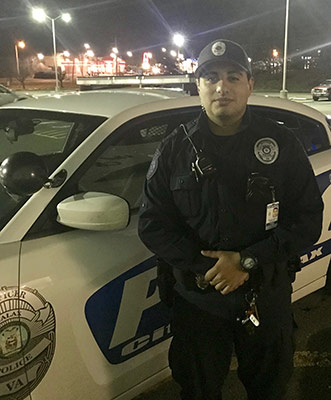Contact Us
To provide feedback on the Community Policing Dispatch, e-mail the editorial board at CPDispatch@usdoj.gov.
To obtain details on COPS Office programs, publications, and resources, contact the COPS Office Response Center at 800-421-6770 or AskCopsRC@usdoj.gov

U.S. Department of Justice
Office of Community Oriented Policing Services
Washington, DC 20530
 The City of Galax is an independent city in southwest Virginia and, uniquely to Virginia, is totally independent of the adjoining counties. The Galax Police Department (GPD) is a state accredited agency whose 24 sworn members meet all of the traditional police/public safety needs for the community. In addition, the department houses a regional E911 call center that serves the city and the two adjoining counties.
The City of Galax is an independent city in southwest Virginia and, uniquely to Virginia, is totally independent of the adjoining counties. The Galax Police Department (GPD) is a state accredited agency whose 24 sworn members meet all of the traditional police/public safety needs for the community. In addition, the department houses a regional E911 call center that serves the city and the two adjoining counties.
In January of 2002, the newly elected Galax City Council envisioned that the newly appointed GPD police chief would lead the agency towards a more proactive kind of policing. Since then, the GPD has completed the Virginia Accreditation Process, a mirror of the CALEA process administered by the Virginia Department of Criminal Justice Services, and has assigned two officers to a problem solving team based on the Scan, Analyze, Respond, and Assess (SARA) police response model. To help us step up this team, the agency partnered with the Roanoke (Virginia) Police Department (RPD) who had implemented a similar model.
The RPD introduced us to the Certified Crime Prevention Community (CCPC) administered by the Virginia Department of Criminal Justice Services (DCJS), the only department of its type in the United States. Agencies who are either CALEA- or Virginia DCJS–accredited can apply for CCPC certification. Once accepted, the program offers mandated and elective programs, and each agency must submit proofs of compliance similar to accreditation.
One of our CCPC elective goals was to implement community outreach programs in different sections of the city. To meet that goal, we decided to collaborate with churches and host meetings with community groups, especially with the Hispanic population. The U.S. Census reports that Galax has a reported Hispanic population of 15 percent; however, the local school routinely reports that the Hispanic student population is between 25 and 30 percent. Four distinct neighborhoods are predominantly Hispanic, with English being a second language for most adults.
Our first community group meeting was with a Hispanic congregation that met in the local Baptist church. The Hispanic pastor’s daughter served as an interpreter. One of the first questions was “How much will a driver’s license cost?” When provided with information about where to go and how much it cost the woman asking the question became very agitated. The interpreter explained that she was asking how much could she pay the police and expecting they would supply the license. She was agitated when I told her that I would not sell her a license. It was readily apparent that our two cultures were suffering from a lack of cultural diversity training on both sides.
Because of this experience, the agency hired the pastor’s wife to teach conversational Spanish classes to GPD staff. It quickly became apparent that some people have an aptitude for a second language while some do not. Twelve staff members started the class and, while all completed it, two members became more fluent in “survival Spanish” but certainly not conversational.
Once we began to build trust, we began to have frequent visits from Hispanic adults, with their children as interpreters so they could ask questions. The children, who were local students, were conversational in both languages. We noticed that there was an increasing number of Hispanic young adults who had grown up and graduated high school in Galax—a pool of untapped recruits for the GPD.
 The GPD applied for funding from the Office of Community Oriented Policing Services (COPS Office) to hire one officer with a demonstrated ability to read, write, and converse in Spanish. In Fall 2011, the COPS Office notified us that we received the funding, and the agency began advertising for a bilingual police officer. We collaborated with Galax City Schools to identify former students that the GPD could recruit. In the end, we hired Officer Silverio Gonzales and he began police academy training in January 2012, and entered field training in July of that year.
The GPD applied for funding from the Office of Community Oriented Policing Services (COPS Office) to hire one officer with a demonstrated ability to read, write, and converse in Spanish. In Fall 2011, the COPS Office notified us that we received the funding, and the agency began advertising for a bilingual police officer. We collaborated with Galax City Schools to identify former students that the GPD could recruit. In the end, we hired Officer Silverio Gonzales and he began police academy training in January 2012, and entered field training in July of that year.
We immediately benefitted from his employment, especially because he was able to assist in identifying previously unknown cultural issues. Like Officer Gonzales, the majority of Galax’s Latino population are of Mexican origin. He explained that in most of Mexico’s police services can be bought for the right price. Criminal justice is not an honored profession. Gonzales was able to become a bridge between the agency and the community. Not only was he able to provide his perspective, but he also immediately began translating for the Department of Social Services and surrounding agencies.
One day, I observed him taking a phone call from a community member calling to report an accident in the county. When I asked why he was receiving the call, he explained it was simpler just to give people his personal number to call rather than having them call Communications; another way Officer Gonzales built relationships and trust with the Hispanic community.
The city received grant funding to revitalize housing in a section commonly referred to as the Bottom, a recently transitioned Hispanic-majority neighborhood. Early into the project, I assigned Officer Gonzales to work with city entities that were identifying residences eligible for renovation assistance. He came to me with the supplied forms and asked if he could revise them because the forms were in Castillian Spanish and most of our residents could not read them. He translated the forms and assisted in the completion of the effort.
 The city successfully completed the project, which was recognized by the Commonwealth of Virginia as the best housing rehabilitation project statewide. A second phase of the grant was recently funded and is currently being implemented.
The city successfully completed the project, which was recognized by the Commonwealth of Virginia as the best housing rehabilitation project statewide. A second phase of the grant was recently funded and is currently being implemented.
In 2018, a second bilingual officer was hired; Officer Eduardo Mata is currently assigned to patrol duties. The opportunity to recruit a bilingual officer to serve the Hispanic community was made possible with COPS Office grant funding. The addition of Officer Gonzales enabled the City of Galax to better serve our Hispanic population, including providing his interpreting skills across all city departments. A by-product of his interpreting skills is evident in the housing rehabilitation project. At the completion of the project, empirical data indicated significant decreases in both crime and calls for service in the improved area.
Rick Clark
Chief (ret), Galax Police Department
Nazmia Comrie
Senior Program Specialist, COPS Office
For more information:
Bridging the Language Divide: Promising Practices for Law Enforcement
Cómo acortar la división del idioma: Prácticas prometedoras para la aplicación de la ley
Engaging Police in Immigrant Communities
Overcoming Language Barriers: Solutions for Law Enforcement
Subscribe to Email Updates
To sign up for monthly updates or to access your subscriber preferences, please enter your email address in the Subscribe box.






